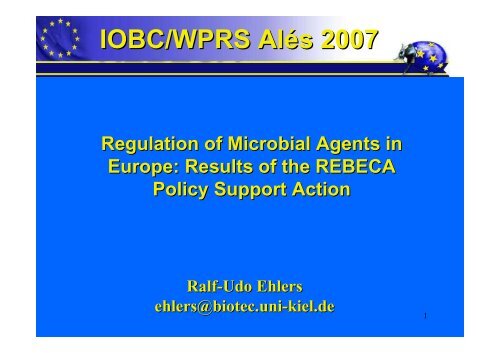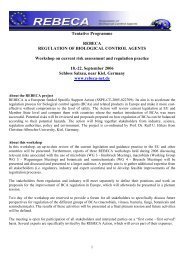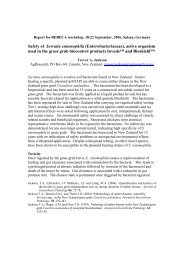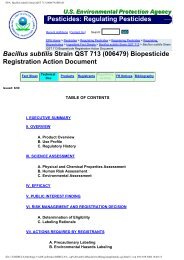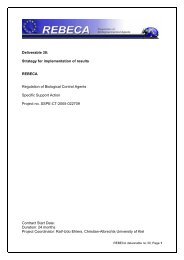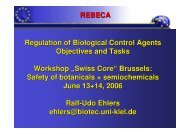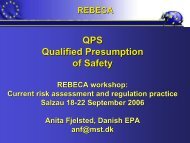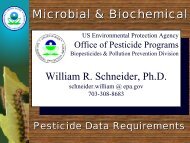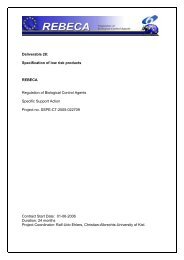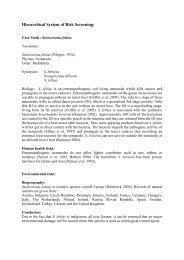Results of the REBECA Policy Support Action
Results of the REBECA Policy Support Action
Results of the REBECA Policy Support Action
Create successful ePaper yourself
Turn your PDF publications into a flip-book with our unique Google optimized e-Paper software.
IOBC/WPRS Alés 2007Regulation <strong>of</strong> Microbial Agents inEurope: <strong>Results</strong> <strong>of</strong> <strong>the</strong> <strong>REBECA</strong><strong>Policy</strong> <strong>Support</strong> <strong>Action</strong>Ralf-Udo Ehlersehlers@biotec.uni-kiel.de1
<strong>REBECA</strong> 2006+2007Why <strong>REBECA</strong> ?To provide environmentally safe,sustainable and cost-effectivecontrolproducts to EU agricultureTo produce more residue-freefoodTo promote SMEs2
<strong>REBECA</strong> StakeholderRegulators: We are hired to regulate, not to havevisions on innovative BCA regulationSANCO: Innovative new regulation. But were BCAsconsidered in <strong>the</strong> proposal?Academia Weed Control: We follow <strong>the</strong> highest ethicalstandards in our risk assessment. Realistic or lack <strong>of</strong>understanding?Companies with registered products: We have done it,you can also do it!Small SMEs: : No expertise3
Some stories going onLIDL-Relation toSuppliers:„For all fresh fruit andvegetables we accept only1/3 <strong>of</strong> <strong>the</strong> allowablemaximum residue levelsaccording to German law “4
Growers under pressure• Pesticide resistance: Many pests, like white flies and thrips,have developed resistance against all available insecticides• Growers spray every two days without much effect on pest,but phytotoxic effects and extinction <strong>of</strong> natural enemies• Major problems to meet levels requested by retailers5
What about this guy ? Wouldn´t he prefer <strong>the</strong>risk related with biocontrol agents?6
How many tones <strong>of</strong> illegal pesticides areconfiscated every year in <strong>the</strong> EU ?7
EconomicsVolume doubled to2% <strong>of</strong> PPPsB. thuringiensis from 95%to 25%Now 55% IBCAs, with10%-20% yearly increase> 90 antagonist speciesmarketed, 40% exoticsMicrobials <strong>of</strong> lessimportance – consequence<strong>of</strong> regulation?8
Growers damand BCABiocontrol Market1985 to 2004Problems with insecticide resistance and residues increaseBut hardly any BCAs on <strong>the</strong> marketWe need accelerated regulation to produce completeport<strong>of</strong>olios for each crop, integrating chemicalsThat is my understanding <strong>of</strong> IPM9
General problems with regulation• Unpredictable: guidelines and proposals for waivers ondata requirements are not binding, a newcomer can askfor <strong>the</strong> complete data package• No harmonisation on procedures, countries have <strong>the</strong>irown interpretation, mutual recognition???• Guidelines not set up for BCAs• Requirements not appropriate for micro-organisms• Regulation authorities have little or no experience go for precautionary principle• High fees, time consuming• Major obstacle: two level registrations - active substanceat EU and PPP in all member states10
History <strong>of</strong> Regulation: A long story <strong>of</strong> failures• Pesticide regulation has gradually become more stringent• Development in close interaction with multinationalagrochemical companies• Regulation based on scientific reports <strong>of</strong> damages• DDT – Data requirements on persistence• OPAs – Due to impact on non-targets now banned• Pesticide regulation and its failures were among mainstimuli for <strong>the</strong> emergence <strong>of</strong> <strong>the</strong> Precautionay Principle11
History <strong>of</strong> Biocontrol Regulation• Regulation was not a gradual evolution involving industry• Regulation was not based on scientific reports <strong>of</strong> damages• BCAs have no evolution <strong>of</strong> regulation rules• Rules for chemical pesticides were copied and pasted• More adapted and more balanced approaches were (andcurrently are) rolled back with <strong>the</strong> introduction <strong>of</strong> 91/414• What was <strong>the</strong> motivation to just use rules developed forchemical control agents on BCAs?• Which pressure groups have been successful implementingexaggerating regulation and thus managed to stop <strong>the</strong>development <strong>of</strong> safe control measures?12
The Precautionary Principle• Rio Declaration: “in order to protect <strong>the</strong> environment, <strong>the</strong>precautionary approach shall be widely applied. Where <strong>the</strong>reare threats <strong>of</strong> serious or irreversible damage, lack <strong>of</strong> fullscientific certainty shall not be used as a reason forpostponing cost-effective measures to prevent environmentaldegradation”• The COM considers that <strong>the</strong> EU has <strong>the</strong> right to establish <strong>the</strong>level <strong>of</strong> protection –particularly <strong>of</strong> <strong>the</strong> environment, human,animal and plant health, - that it deems appropriate• (Communication <strong>of</strong> <strong>the</strong> COM on <strong>the</strong> PP (COM2000/1)13
The Precautionary Principle• Where <strong>the</strong> levels <strong>of</strong> uncertainty are high, where potentialimpacts are very large, and/or where those impacts may beirreversible, <strong>the</strong>re are grounds for adopting a precautionaryapproach until such time as we have sufficient scientificknowledge to make a risk-based decision. (Communication <strong>of</strong><strong>the</strong> COM on <strong>the</strong> PP (COM2000/1)• Does this apply to biological control?• EU and MS regulatory approach is now <strong>the</strong> PP: We have toconsider any possible risk• But <strong>the</strong>y do not comply with EU COM rules !!!14
COMMISSION COMMUNICATION ON THEPRECAUTIONARY PRINCIPLE (COM(2000)1• PP is relevant only in <strong>the</strong> event <strong>of</strong> a potential risk• Before invoked, scientific data relevant to <strong>the</strong> risks must first beevaluated. However, one factor logically and chronologically precedes thisevaluation, namely identification <strong>of</strong> <strong>the</strong> potentially negative effects <strong>of</strong> aphenomenon.• Scientific evaluation <strong>of</strong> <strong>the</strong> potential adverse effects should be undertakenbased on <strong>the</strong> available data when considering whe<strong>the</strong>r measures arenecessary• These general principles include:- proportionality- non discrimination- consistency- examination <strong>of</strong> <strong>the</strong> benefits and costs <strong>of</strong> action or lack <strong>of</strong> action- examination <strong>of</strong> scientific developments15
Registration keeps safe products <strong>of</strong>f <strong>the</strong> market• Dir91/414: Time consuming (8 years)• National registration has to follow (2 years)• High costs (> than 2 million €)• Knowledge resources required• BCAs are specific – market is small• Market size does not always provide return <strong>of</strong> investment• Registration is a blackbox: no investment• Barrier <strong>of</strong> entry for SMEs• BCAs sit on <strong>the</strong> shelf <strong>of</strong> <strong>the</strong> scientists• Technical progress is not introduced into <strong>the</strong> market• BCAs suffer from introduction <strong>of</strong> PP• Regulation serves as a justification for disguised protectionism• Political agenda (EU CAP and pesticide reductionprogramme) not achieved16
Political objectives:• Authorities should not regulate trivial risks• We need less and not more regulation (OECD)• We need Cost-Benefit-Analysis <strong>of</strong> Regulation and Risk-Trade<strong>of</strong>f-Analysis prior to introduction <strong>of</strong> new regulations• Weigh costs <strong>of</strong> regulation - benefits and trade<strong>of</strong>fs• Then develop balanced regulation rules• <strong>REBECA</strong> is calling for public-private partnership to developinnovative balanced approaches for regulation <strong>of</strong> BCAs17
Achievements:Initiate discussion in <strong>the</strong> EU and connect stakeholdersBiocontrol is now highly political (SANCO and Head <strong>of</strong> DGResearch at medium term report meeting in Brussels)EU parliament considering to stop new regulation if notmore emphasis is given to biocontrol situationComparison <strong>of</strong> EU and Non-EU regulationProposal to put baculoviruses on Annex 1Statement on contamination levelsDiscussion paper on „relevant“ metabolites„Lesson learn exercise“ from list 4 processProposals for innovative regulation approach18
Final Meeting Brussels SAS Radission HotelSeptember 20 + 21, 2007Register now: www.rebeca-net.deThanks for your attention19
www.rebeca-net.deYou find lots <strong>of</strong>informationincluding this talk20


